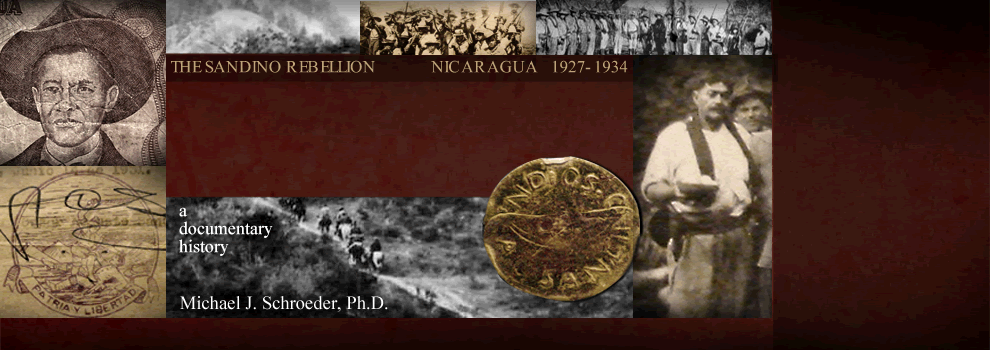|
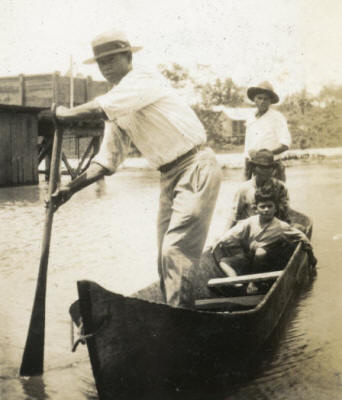 THIS IS THE sixth PAGE
of documents for the second HALF of 1928
on Nicaragua's Caribbean Coast
region, housing materials dated during the 37 days from November 25 to
December 31.
THIS IS THE sixth PAGE
of documents for the second HALF of 1928
on Nicaragua's Caribbean Coast
region, housing materials dated during the 37 days from November 25 to
December 31.
Perhaps the most illuminating
document on this page is
Major Utley's 7-page memorandum on
the history of the Eastern Area
(December 26), which provides a very
fine synopsis of events and helps to
put all the previous pages'
radiograms & missives in a broader
context, and which can be fruitfully
read alongside his draft manuscript
on the same subject (Dec. 23).
Also revealing of broader themes is
the complaint against Sgt. McGregor
(20 & 27 December). The
various statements & depositions in
the case show the racist and haughty
behavior typical of some Marines,
the sense of fair play & respect
practiced by others, and most
importantly, Costeños' insistence on
their rights and refusal to be
treated as second-class citizens.
Major Sage's memorandum of 14
December offers insight into the
Marines' efforts to adapt to local
circumstances to improve their
transport & communications
capacities. A specific
instance of these efforts can be
found in Capt. Burks' report of 15
December on "Boats and boatmen used
by Captain Edson's command," which
also helps to clarify the role of
Miskitu boatmen in Edson's Río Coco
expedition. Many of these
documents offer insight into
contests over legitimate authority
in the region — for instance, US
mahogany exporter C. C. Mengel's
letter to Senator Sackett (Dec. 29)
complaining about the "illegal acts
and interference by the so-called
Nicaraguan Liberals who are opposed
to the Constitutional Government of
Adolphus Diaz" (curiously, Mr.
Mengel seems unaware that the
Liberal Gen. Moncada was elected
president nearly two months before),
and C. G. Eames' letter to the
Marines complaining about Indians'
unbridled lawlessness in & around
Cabo Gracias a Dios (Dec. 31).
And so 1928 comes to a close, without
the Sandinistas yet setting foot in
the Caribbean Coast region proper.
|
|
PERIOD MAPS
|
|
1894 mosquito
shore

27 MB,
library of congress
|
1920s
Standard Fruit

6.5 mb,
US National archives
|
1928 Rio wanks
Patrol

3 mb, us
national archives
|
1931 Moravian

2.4 mb,
comenius press
|
|
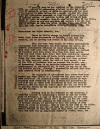
|
25 November
1928.
Memorandum for Major Schmidt, B-2, from
Capt. M. A. Edson, Poteca, p. 1.
"There is little
change in bandit information here. Have
taken statements of Briseño, local juez
for Sandino, and am letting him return
to his home to-day. ¶ This far have been
unable to obtain satisfactory statements
from Hernandez and Mora beyond the
middle of August. Information obtained
by local inhabitants state that they
left here with Pedro Altamirano after
the contact at YACALWAS Sept 2/3, 1928;
that they have been active with his band
since that date; that when Altamirano
crossed the COCO about the date of Capt.
Hall’s contact (RIO CUA) these two were
members of his band; and that they
returned to this vicinity about the 24th
of last month. It was on the 26th of
November that we secured the pistol,
etc., of Hernandez. There is no definite
information that they participated as
principals or, in fact, in any way in
the SAN MARCOS affair, although I
personally believe that they were
present there as subordinates. ¶ The
majority of inhabitants here state that
Hernandez has been active as a bandit
for the past year; that some political
and personal grudge assassinations in
this vicinity were committed by him or
under his direction; he had with him an
order from Altamirano to kill one
Braulio Morales, who has been an active
agent for us; and that he is greatly
feared by the majority of the
inhabitants throughout the valley. ¶
Knowing that he had returned to the
vicinity, I took the liberty of
addressing a letter to him the latter
part of November, a copy of which is
enclosed. He has been in possession of
this letter for a month, and had not
acted upon the invitation extended to
turn himself in. I believe it betters
policy, if possible to have him living
at home where he could be watched, than
in some hidden camp in the hills.
However, since he did not act upon the
letter, I do not feel myself obliged to
turn him loose at this time, and intend
to keep him here for an indefinite
period at POTECA. Mora, the . . . "
|
|
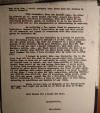
|
25 November
1928.
Memorandum for Major Schmidt, B-2, from
Capt. M. A. Edson, Poteca, p. 2.
". . . man with
him, I shall probably turn loose upon
his promise to behave himself. ¶ With
Hernandez, Mora and Brisaño here, the
river is cleared of all known bandit
sub-jefes except one, Capt. Emilio
Aguila, resident of MASTAWAS, from that
point to and including GUIGUILI, Aguila
is believed to be in the vicinity of
MASTAWAS now and his apprehension or
surrendering is expected. ¶ Am enclosing
a few papers found in possession of
Hernandez. Request that a translation be
made and that copies of all messages and
papers in connection with this
particular group be furnished me. ¶
Information was furnished by a native of
GUIGUILI that following Capt. Hall’s
contact of 19 Nov. 1928, Altamirano and
his group crossed the COCO and withdrew
to a small canyon of the GUIGUILI RIVER
near VENTILLO. Also that MT. VENTILLO is
and has been a bandit stronghold, with
much corn, bananas, cattle, etc., and
fresh water available and that it is
used by Sandino when CHIPOTE and other
known camps become too hard pressed for
him. I have reported this by radio via
EASTERN AREA. ¶ I intend to patrol this
area thoroughly. Due to the fact that
all but the sick in this organization
have averaged twenty days or more out of
each month on active patrolling since we
arrived here in August, and that
three-fourths of them returned from
patrol on the day before Christmas, I
would prefer to delay this investigation
of VENTILLO until after the 10th of
January or after Major Utley’s
inspection the first of next month. If
you consider this patrol urgent, of
course I am ready to start at any time.
I have in mind for this expedition,
entering VENTILLP and CHIPOTE from
GUIGUILI, then if warranted, swing
south, cross the COCO and again patrol
the CUA - GUASANEROS GUAPINOL area
before returning to POTECA, a trip of
about three or four weeks, depending on
conditions and bandits if any found. ¶
Navas arrived here at midnight of the
twenty-fifth left here last night and
should be at BOCAY by noon of to-day,
the 27th. ¶ Best wishes for a
Happy New Year ¶ Respectfully ¶ M. A.
Edson."
|
|
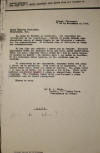
|
28 November
1928.
Letter from Capt. M. A. Edson,
Comandante de Poteca, to Sr. Ruperto
Hernandez, Esquipulas.
|
|
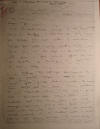
|
29 November
1928.
Letter from Capt. M. A. Edson, Poteca,
to Major Utley, Puerto Cabezas, p. 1.
"Dear Major: ¶ To
acknowledge receipt of the Area
Marching-Drinking or What-have-you song
and the October (?) 1928 letter of
instructions. Except for rather rainy
weather today – our first rain in two
days – the holiday will prove a fair
enough effort at the old tradition of
Thanksgiving – sports and an aching
belly. ¶ Rutledge has not yet been
found. His body is probably lodged in
one of the rough spots of the Poteca –
although it may have drifted past the
Coco. I have established a river lookout
which I will keep up for a week. He
could swim only a little and evidently
lost his head when the boat swamped at
the end of the rapids. This water was
over his head but the current usually
carries me to shallow water – and had he
not become excited, he would easily have
reached shore, I believe. A full report
. . ."
|
|
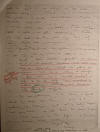
|
29 November
1928.
Letter from Capt. M. A. Edson, Poteca,
to Major Utley, Puerto Cabezas, p. 2.
" . . . will be
sent in as ordered by your radio
8628-0931. Pollock being in command of
the patrol is quite down hearted,
thinking himself responsible. ¶ We lost,
also, 2 BARs – 1 sub Thompson and 2
rifles, as yet unrecovered. Twelve (12)
rifles and similar arms were lost but
seven have been recovered. ¶ Burke sent
in the following code message as you may
already have a copy. ¶ Quote Have
reliable information the source of which
I cannot disclose that Altiramano has a
personal interest in getting you comma
that he is willing to sacrifice a few
men in a small ambush in order to do so
stop This considered by natives as bad
attitude and dangerous stop Burke
unquote. ¶ You can imagine I am losing a
great deal of sleep over this – and if I
return to Cabezas next 4th of July
haggard and grey haired you will know
the reason therefore. ¶ Best regards to
the Mess – particularly to my drunken
raiding padres.¶ Respectfully, ¶ Edson."
|
|

|
4 December
1928 (1122).
Radiogram from Capt. M. A. Edson, Poteca, to
Gen. Feland, Managua.
"8603 REQUEST
BRIGADE POLICY REGARDING NATIVES WHO
HAVE RETURNED HOME BUT HAVE NOT
PRESENTED THEMSELVES THIS COMMAND STOP
NO REPEAT NO EVIDENCE P A R C K Y O H
ATION (PARTCIPATION ?) SAN MARCOS AFFAIR
1122"
|
|

|
10 December
1928 (0930).
Radiogram from Capt. M. A. Edson, Bocay, to
Major Utley, Puerto Cabezas.
"8610 YOUR 8609
1905 LETTER MAJOR SCHMIDT TO EDSON AS
FOLLOWS COLON IF THOSE MENTIONED ARE
SELF CONFESSED BANDITS THEY SHOULD HAVE
REPORTED TO YOU STOP IF THEY HAVE
RETURNED TO PEACEFUL PURSUITS LET THEM
REST ON PROMISE TO KEEP YOU INFORMED OF
ALL BANDIT INFORMATION STOP 0930."
|
|
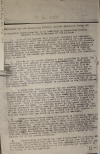
|
14 December
1928.
Memorandum for the Inspecting Officer
Col. Archibald Young, from
Major A. B.
Sage, Bluefields, p. 1.
""Reference (a)
Recommendation to be submitted by
Commanding Officer relative to the
efficiency of the command. ¶ 1. I
am of the opinion that the most
important and necessary element required
to carry out efficiently the mission of
this command is water transportation. At
the present time all patrols and
missions in connection with the
enforcement of the Hacienda Laws are
dependent on hired or free water
transportation. The cost of
transportation is considerable when
hired, the use of free transportation is
unsatisfactory because the movement of
the patrols is dependent on the regular
schedule of the banana and mahogany
barges on which the transportation is
secured. ¶ 2. Patrols on the rivers
require a boat propelled by power. The
use of canoes with paddles is slow and
unsatisfactory. Only small distances can
be covered and too many men are required
as paddlers. The ideal transportation
for the rivers is a native canoe with an
outboard motor. The canoes are available
here and the motor can be purchased for
approximately $150.00 each. At least
four motors are required. One for use at
Bluefields, on at Rama and two on the
Rio Grande River. These motors are
simple of operation, economical in the
use of fuel, easily transported and
cover considerable distance in a days
run. Gasoline is available throughout
the Area but it is desirable that
considerable supply be purchased in the
United States and shipped here. ¶ 3. A
heavy duty boat is required for the
outside trips between San Juan and
Bluefields, Bluefields and Rio Grande
and Rio Grande to Puerto Cabezas. At the
present time only one schedule of boats
runs between San Juan and Bluefields.
The fare costs $5.00 each way and it
will be seen that the transfer of men
between stations, the required
inspections of the command will result
in a considerable figure in a years
time. This is only an illustration and
all other stations on the coast are the
same. In addition should an emergency
arise it becomes necessary to hire a
boat and the cost is then expensive. The
type of boat is a matter which the
undersigned would prefer to leave to
someone more familiar with these matters
but it will require a boat and engine
that can stand up in any sort of
weather. ¶ 4. Communication between
posts in the Area is difficult. There is
a telegraph line between Rama and
Bluefields, no communication at all
between San Juan and Bluefields, some
between this place and Las Perla or Rio
Grande Bar. Radio communication can be
held between La Cruz, Puerto Cabezas and
Bluefields. It is not known what steps
can be taken to bring pressure to bear
on the proper branch of the government
to repair the telegraph lines freely in
use but it is believed that such steps
should be taken, this not only as a
benefit to the Guardia but to the entire
community. ¶ 5. Considerable difficulty
has been experienced in obtaining
clothing. Requisitions have been
submitted in due time but due to a
shortage of clothing on hand it has been
necessary at times for men to continue
wearing clothing which is not suitable
nor conducive to the morale of the men
concerned . . ."
|
|
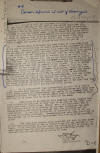
|
14 December
1928.
Memorandum for the Inspecting Officer
Col. Archibald Young, from
Major A. B.
Sage, Bluefields, p. 2.
" . . . [section
missing] compares very favorably with
the standard throughout the Area. There
has been a feeling on the part of the
better qualified privates that they do
not care for promotion to the grade of
corporal or sergeant due to the small
amount of pay involved and the
responsibilities of the higher rank. I
am in favor of a change of the pay table
by which the difference between the
privates and corporals pay would be
greater than it is at present and which
would lend attraction to the promotion
to the higher rank. This should be
carried also to the grades of sergeants
and first sergeants. ¶ 7. Considerable
difficulty has been found in obtaining
board for the men on detached duty at
small posts on the allowance of thirty
cents a day. Economic conditions on this
coast are utterly different from the
Pacific side and it has been found
impossible at some places to even obtain
rice and beans as a steady diet for less
than fifty cents per diem. By the
exercise of economy and close
supervision it has been possible to
ration the men at the Sub-Divisions on
thirty cents per day. All supplies are
purchased locally and shipped to the
subdivisions and by this method the
allowance has not been exceeded. The
savings have been made to amount to any
figure. It is of course impossible to
run a separate mess for two, three or
four men, the necessary cooking
utensils, purchase of supplies, detail
of cooks, etc., makes this out of the
question. It is recommended that
wherever required an allowance of fifty
or sixty cents be authorized. An
illustration of this matter is at Puerto
Cabezas. Only one person was found who
would ration the Guardia for fifty cents
a day, all other demanding up to $1.00
per day. This of course is due to the
large force of laborers at Puerto
Cabezas and to the fact that they are
allowed $0.75 and $1.00 per day for
their living. ¶ 8. It is recommended
that arrangement be made for a weekly
plane service from Managua. All mail and
correspondence now takes from three
weeks upward for transmission and reply.
It is believed that the local Commanding
Officer of Marines would also be
benefitted by this move and it is known
that he is in favor of the same. ¶ 9.
Conditions in an Area of this size and
nature require that more officers be
assigned to duty than in an area on the
other side where railroads, automobiles,
trails, etc., are available. One or two
officers should be constantly on the
move throughout the Area making patrols
and becoming familiar with the territory
and the inhabitants. It has been
impossible to accomplish this so far due
to lack of officer personnel.
Recommendations have been submitted to
this effect and it is again recommended
that they be given consideration. ¶ 10.
Two qualified buglers were requested for
duty in this Area. It has been
impossible so far to enlist a man who
can perform on the bugle. It is believed
that at least one bugler should be
present at Area Headquarters to blow the
routine calls including colors, for
funerals and the publication of orders
in town. ¶ A. B. Sage, ¶ Major, GN. ¶
Area Commander."
|
|
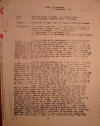
|
15 December
1928.
Report on Boats and Boatmen Used by
Capt. Edson's Command,
Capt. J. J.
Burks, Bocay, to Col. A. Young, p. 1.
"References: (a)
Letter Commander, Eastern Area,
Nicaragua, to Commanding Officer, Camp
Utley, Bocay, Nicaragua, dated 15
November, 1928, same subject. ¶ (b)
Enclosure 1 to reference (a) ¶ (c)
Enclosure 2 to reference (a) (Capt.
Edson’s report). ¶ 1. Since, as stated
in reference (a) “Captain Edson’s report
covers only one side of this question”,
and since that report contains certain
statements which tend to show a lack of
co-operation on the part of the
Commanding Officer at Bocay with Captain
Edson at Poteca during a part of the
time at which I was in command at Bocay,
which statements as far as I am
concerned are wholly without
justification, I wish to acquaint the
Command Eastern Area with all of the
facts in connection with the matter
dealt with. This communication was not
received at Bocay until on or about
December 10, 1928. ¶ 2. Quoting from
reference (c), “(B) A rescue was
submitted to CO Bocay to furnish me with
ten (10) boatmen over a month ago and
nothing has come of that request to
date.” If such a request was submitted
to the Commanding Officer at Bocay at
that time, it was before my arrival at
Bocay, since the report was dated
“10-30-28”. Nothing regarding any such
request has ever come to my attention
either by written or verbal means, even
tho Captain Edson had ample opportunity
to, and did communicate with me during
the month period he referred to. He made
no mention to me at any time of having
made any such request of the Commanding
officer at Bocay nor did he at any time
make his wishes known to me along the
line of hiring boatmen for him. ¶ Again,
he states, “(c) Two of my prisoners were
sent to Bocay sick. Others now there
attempting to gather crew for me which
Bocay has failed to materialize to
date.” At the time Captain Edson sent
the two Indians referred to here, he
wrote me under date of October 24th.,
that these two Indians were to hire or
obtain eight others and return here
---”. He made no mention at that time of
any boatmen he had requested the
Commanding Officer at Bocay to hire for
him or of any assistance he desired me
to give the two men he sent here. I
asked one of these men if there was
anything that I could do to help him and
he replied that there was not. I then
presumed that they had special
instructions from Captain Edson and that
any assistance from me was not wanted.
After about two weeks had elapsed, I
made inquiries to ascertain if anything
had been done relative to the hiring of
these eight men and found that none had
been hired. I spoke to Mr. Thompson at
that time with . . . "
|
|
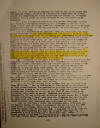
|
15 December
1928.
Report on Boats and Boatmen Used by
Capt. Edson's Command,
Capt. J. J.
Burks, Bocay, to Col. A. Young, p. 2.
". . . regard to
this and at my request he located and
hired eight men for Captain Edson, which
were immediately dispatched to Poteca.
Before the departure of these eight men
for Poteca Mr. Thompson advanced them a
total of fifty dollars of his own funds
in my presence. ¶ (c) I am without
knowledge of the matter contained in
Captain Edson’s statements regarding Mr.
Thompson. I do know that since I have
been at Bocay, both Mr. Thompson and Mr.
Webster have co-operated with me to the
fullest extent in all dealings which I
have had with them. ¶ (d) The statements
of Captain Edson to the effect that all
matter relative to the unwillingness of
the Indians to make trips to Poteca
originates with Mr. Thompson and that
there is, he believes little if any
truth in it, is not founded on any facts
or circumstances as I see them here. The
boat trip with loads of supplies from
Bocay to Poteca is a much easier and
quicker trip than the one from Waspuc to
Bocay and for that reason is admittedly
more profitable to Mr. Thompson than the
latter trip. This I think eliminates any
possible motive from a financial
standpoint on the part of Thompson to
not want the boat crews to go to Poteca.
I know of no other motive that he could
have, since there is never any
difficulty in obtaining boat crews for
other places. I know that at the time in
question the Indians were unwilling to
go to Poteca because I saw evidences of
it myself. ¶ (e) Relative to the last
statement in Captain Edson’s report
regarding the rations furnished by Mr.
Thompson to his boat crews which he
states Lieutenant Pollock desired
brought to your attention, I do now know
hoe either Lieutenant Pollock or Captain
Edson at Poteca can know what amount of
rations Mr. Thompson furnishes his boat
crews at Bocay and for that reason
whether such rations are sufficient or
of what disposition these boat crews
make of their own rations after leaving
Bocay. ¶ (f) I have never concerned
myself with the amount of rations Mr.
Thompson furnishes his boatmen as I
regard that as purely his business as I
consider that he knows far better than I
what constitutes a sufficient boat crew
ration. ¶ (g) As to the rations being
broken into on the trip from here to
Poteca, I had no knowledge of that prior
to the receipt of this communication.
The memorandum receipts have been
returned from Poteca signed by an
officer for all supplies shipped there
without any notation or report of any
kind of any breakage or pilfering being
made to me. Mr. Thompson has agreed to
be held responsible for any pilfering or
thefts by his crews. Had I known of this
pilfering I could have held Mr. Thompson
responsible and he could have held the
boat crew in question responsible which
would probably have prevented any
recurrence of the same. ¶ (h) At the
time I wrote the personal note,
reference (b), to Captain Edson, in
which I requested him not to hold the
one boat crews at Poteca, which by so
doing would keep them away from the
polls here on election day, I regarded
it as my duty to do so. My understanding
was that our primary duty here was to
guarantee a fair election and I
considered that his crews should be
allowed to return here in time to vote
if they so desired. Before these boatmen
left here I assured them that they . . .
" [p. 3 missing]
|
|

|
16 December
1928 (1230).
Radiogram from Capt. J. J. Burks,
Garrobo, to Major H. H. Utley, Puerto Cabezas.
"8616 TWO PLANCES
OVER ABOUT 1115 DROPPED CLOTHING AND
MAIL STOP PROCEEDED SOUTH DIRECTION STOP
PLANES RETURNED AT 1200 AND DROPPED TWO
HUNDRED AND SEVENTY POUND OF RATIONS
STOP 1230."
|
|

|
16 December
1928 (1638).
Radiogram from Capt. M. A. Edson,
Poteca, to
Capt. J. J. Burks, Bocay.
"8616 ONE BOAT
NINE INDIANS CLEARED FOR BOCAY AT 1600."
|
|

|
17 December
1928 (1655).
Radiogram from Capt. J. J. Burks,
Garrobo, to Major H. H. Utley, Puerto Cabezas.
"8616 PATROL LEFT
LA PITA NOON FIFTEENTH ARRIVING HERE
FOURTEEN THIRTY TODAY STOP AREA COVERED
AS ORDERED IN FIELD ORDER STOP PATROL
REPORTS NO TRAILS LEADING TO OR IN
DIRECTION OF KILAMBE FROM THIS SIDE STOP
ALL NATIVES SAY THERE ARE NO BANDITS AT
KILAMBE COME BUT THAT THEY ARE AT EL
CHIPOTE AND THAT NONE HAVE BEEN IN AREA
SINCE MAY ALL NATIVES WORKING AND
FRIENDLY STOP PATROL SEARCH FOR GRAVE OF
CPL WILLIAMSON AND FOUND AN OPENED GRAVE
AT ZAPOTE WITH SERVICE BLANKET PARTIALLY
IN IN THE BLANKET HAD R HUGHES NAME ON
IT STOP NO OTHER MARK OF INDENTIFICATION
FOUND STOP ZAPOTE IS TWO AND ONE HALD
MILES SOUTHWEST OF EL CEDRO ON MAIN
TRAIL STOP NATIVES SAY SANDINO MOVED THE
BODY STOP FRIENDLY NATIVE TRYING TO
LOCATE BODY STOP UNABLE TO LOCATE PACK
ANIMALS STOP TWO MEN RETURNED WITH FEVER
STOP MORALE EXCELLENT 1650."
|
|

|
18 December
1928 (1130).
Radiogram from Major
H. H. Utley, Puerto
Cabezas, to Gen. Feland, Managua, with
copies to COs Poteca, Garrobo, Cuvali.
|
|

|
20 December
1928 (1611).
Radiogram from Gen. Feland, Managua, to
Major H. H. Utley, Puerto Cabezas.
"Any women or
children taken with bandits should not
repeat not be considered as prisoners or
treated or reported as such."
|
|
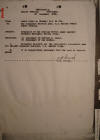
|
1.
20 December
1928.
Report on Complaint of one Nicolas
Torres Lagos against Sgt. McGregor,
USMC, by Major C. R. Darrah, Puerto
Cabezas, to Major H. H. Utley, Puerto
Cabezas, p. 1.
"Enclosures: (1)
Statement of Nicolas T. Lagos. ¶ (2)
Statement of Ida Bodden. ¶ 1. Forwarded
herewith are the enclosures, statements
made out against Sergeant McGregor, U.S.
Marine Corps. ¶ 2. It is respectfully
requested that the same be investigated.
¶ C. R. Darrah . . ."
|
|

|
2.
20 December
1928.
Report on Complaint of one Nicolas
Torres Lagos against Sgt. McGregor,
USMC, by Major C. R. Darrah, Puerto
Cabezas, to Major H. H. Utley, Puerto
Cabezas, p. 2.
". . .
Interpretation of Statement of Ida
Bodden. ¶ About 6:00 p.m., 18 December
1928, I was at my house which is
situated in Bilway (Old Bilway) this
locality, holding a conservation with a
sergeant of the United States Landing
Forces named McGregor, when two American
Citizens passed, one of them asked
McGregor if he remembered the individual
that he had hit with a black jack, (the
individual of whom they were referring
is Mr. Nicolas Torres Lagos) then he
said he heard that when McGregor saw him
again he would shoot him. At which
McGregor responded, that on the first
occasion that he saw Lagos at night, he
would kill him and cut him up, at which
expressions the person making the
statement did not feel very comfortable,
because on one occasion Mr. Lagos was
beaten by several, and I told the
sergeant, that there had been no reason
for it, and more, he would have to kill
me and the woman of Lago’s also. At
which McGregor responded, that to kill
three Nicaraguans was the same as
nothing. Then I called Señora Claudina
Padilla to serve as a witness to
McGregor’s words, but she got up and
left the place where we were, and he
would not repeat his expressions. This
is all I can declare in this case. ¶
SIGNED Ida Bodden. . ."
|
|
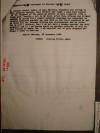
|
3.
20 December
1928.
Report on Complaint of one Nicolas
Torres Lagos against Sgt. McGregor,
USMC, by Major C. R. Darrah, Puerto
Cabezas, to Major H. H. Utley, Puerto
Cabezas, p. 3.
". . .
Interpretation of Statement of Nicolas
Torres Lagos¶ I, Nicolas Terres Lagos,
of age, Married, chauffer and living in
this locality declare, that without any
right I have been beaten by the sergeant
of the American Forces in this locality,
with a black-jack, causing a cut on my
head. After this offense and without me
giving him a reason Sergeant McGregor
has expressed on several occasions
against me, and that on the first
occasion he got he would kill me,
because killing one Nicaraguan had no
value. For my part I declare, that I do
not hold a grudge against the said
sergeant, and if I am beaten again on
another occasion it will be just because
he wants to. I am careful not to give
Sergeant McGregor a cause to beat me. ¶
Puerto Cabezas, 20 December 1928. ¶
SIGNED Nicolas Torres Lagos . . ."
|
|
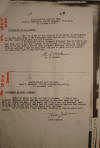
|
4.
20 December
1928.
Report on Complaint of one Nicolas
Torres Lagos against Sgt. McGregor,
USMC, by Major C. R. Darrah, Puerto
Cabezas, to Major H. H. Utley, Puerto
Cabezas, p. 4.
". . . STATEMENT
OF R. C. ATKINS ¶ I was in Bilwi on the
evening of December 18, 1928. While on
my way back home I meet Sergeant
McGregor. We were talking and I mention
about Mr. Wilkes and his troubles. ¶ I
personally heard Sergeant McGregor say
he didn’t see why they didn’t get him
instead of Mr. Wilkes for he was the one
that had to do the work. I didn’t hear
Sergeant McGregor threaten anyone’s life
at any time I was talking with him, and
he walk with me almost through Bilwi
when I started home. ¶ R. C. ATKINS ¶
STATEMENT OF ROSS JOHNSON. ¶ While in
Bilwi on the evening of December 18,
1928, I met Sergeant McGregor. I stop
and was speaking to him, when someone
said have you heard any more about Lagos
and Wilkes case and McGregor said no,
only that it was funny Lagos had not
taken action against him instead of
Wilkes as it as him who hit Lagos over
the head. ¶ At no time did I hear
McGregor threaten or say he would kill
anyone. ¶ Ross Johnson . . ."
|
|
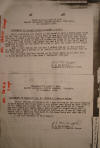
|
5.
20 December
1928.
Report on Complaint of one Nicolas
Torres Lagos against Sgt. McGregor,
USMC, by Major C. R. Darrah, Puerto
Cabezas, to Major H. H. Utley, Puerto
Cabezas, p. 5.
". . . STATEMENT
OF D. K. McGREGOR, SERGEANT U.S.M.C.¶
While attending the fights in the
machine shop, I heard some noise at the
door so went over to see what it was
about. Upon my arrival at the door I
heard G. Wilkes, who was night watchman
say drop that knife, so I stepped in
front of him and flashed my light as it
was dark, when I seen on taxi driver
name Lagos who had a knife in his hand.
When I demanded he give me the knife he
tried to hide the knife in his right
hand hip pocket. ¶ When I seen him go
for his hip I struck him as it was
possible he might have had a pistol in
it, which I could not ascertain till he
had been searched. ¶ If the knife had
been handed me at first there would have
been no blows struck and no time have I
threatened this man. ¶ D. K. McGregor, ¶
Sergeant, U.S. Marine Corps. ¶ STATEMENT
OF SERGEANT D. K. McGREGOR, U.S. Marine
Corps. ¶ In the evening of December 18 I
as sitting on the porch talking to Miss
Bodden when Rose Johnson and Atkins came
along we were talking of the thing and
another when one of the boys asked me if
I heard any more about the Lagos case. I
said no, but it seemed funny that he did
not take action on me instead of G.
Wilkes as it was me that had struck him
so hard and they said it did seem funny
and that was all that was said about the
case. ¶ I did not threaten to kill
anyone. ¶ D. K. McGregor, ¶ Sergeant,
U.S. Marine Corps . . ."
|
|
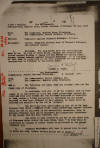
|
6.
20 December
1928.
Report on Complaint of one Nicolas
Torres Lagos against Sgt. McGregor,
USMC, by Major C. R. Darrah, Puerto
Cabezas, to Major H. H. Utley, Puerto
Cabezas, p. 6.
" . . . Enclosure:
Letter, Commander Eastern Area to
Sergeant McGregor, and attached papers.
¶ 1. Returned. The enclosures show the
investigation made by me. In view of
these facts, charges are herewith
proffered against Nicolas T. Lagos and
Ida Bodden for making slanderous, untrue
remarks against Sergeant McGregor. It is
requested that they be prosecuted to the
full extent of the law and this
headquarters be informed of the action
taken. HAROLD H. UTLEY. ¶ 1. The
following are taken from the Criminal
Code and the Penal Code of Nicaragua. ¶
In accordance with Art. 31 of the
Criminal Code of Nicaragua, it is
impossible to start any legal
proceedings against Mr. Lagos and Miss
Aida Bodden for the offenses mentioned
as committed by them, unless a formal
accusation is introduced by the person
supposed to have been offended by said
persons, as these sorts of offenses are
qualified by the law as ‘private’. ¶ The
above has been established to Art. 40 of
the same Criminal Code which literally
reads: Legal proceedings against
offenses which can not be indicated by
the authorities themselves (like in
private offenses) only can be denounced
and accusations introduced by the person
that has been offended, etc. ¶ The above
is also covered by Art. 392 of the Penal
Code of Nicaragua which orders the same
thing, this: ‘Nobody shall be prosecuted
by calumny or insult unless so
petitioned by the person offended, etc.
¶ 2. Sergeant McGregor will have to
appear her in court to place his case,
before further action can be taken. ¶ C.
R. Darrah . . ."
|
|
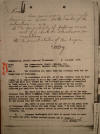
|
7.
20 December
1928.
Report on Complaint of one Nicolas
Torres Lagos against Sgt. McGregor,
USMC, by Major C. R. Darrah,
Puerto
Cabezas, to Major H. H. Utley, Puerto
Cabezas, p. 7.
" . . . Rose - ¶
Use your own judgments having in view
both sides of the situation – i.e. ¶ The
desirability of putting some sort of a
check on slanderous accusations ¶ The
present status of McGregor ¶ Utley."
|
|
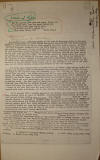
|
1.
23 December
1928 (approximate date).
Manuscript on Eastern Nicaragua, by
Major H. H. Utley,
p. 1.
" “Oh! The Eastern
Area grew and grew, Hablas tu! ¶ The
Eastern Area, grew and grew, Hablas tu!
¶ The Eastern Area grew and it grew, ¶
We don’t know what it’s coming to, ¶
Hinky Dinky Hablas tu!” (Area Song.) ¶
Practically every revolution worthy of
the name in Nicaragua began on the east
coast and consequently our naval forces
frequently operated off that coast and
many landing parties have from time to
time occupied strategic points ashore.
In Jan 1927 one battalion (Bartlett’s)
of the Fifth Marines was sent to the
coast from Guantanamo. Lieutenant
Colonel J. J. Mende was sent from
Washington to take command of this
battalion. Landing parties of both
marines and bluejackets from the ships
on the east coast patrol, including a
destroyer division, covered the coast
and as far inland as EL GALLO and RAMA.
The tactical command of these forces was
vested in the senior naval officer of
the east coast patrol. This force was
reduced to one company, the 51st
(Kendall’s) which garrisoned BLUEFIELDS,
PUERTO CABEZAS, and EL GALLO, with small
outposts at EL BLUFF across the lagoon
from BLUEFIELDS and the location of the
BLUEFIELDS Custom House, and at WAWA
CENTRAL at the end of the railroad out
of PUERTO CABEZAS. Command had reverted
to the 5th Regiment ¶ The coast line
extends north and south almost 250
miles. There are no roads, few trails,
one railroad about 86 kilometers long
extending from PUERTO CABEZAS through
the farms of the Standard Fruit and
Steamship Co to WAWA CENTRAL; but there
are nine routes east and west: the WANKS
(called the COCO on some maps) River,
the CUCALAYA River, the BAMBANA River,
the PRINZAPOLKA River, the TUMA River
(which empties into the GRANDE), the
GRANDE River, the KURINGWAS River the
ESCONDIDO River, and the SAN JUAN River.
North and south practically all travel
is in small coasting power schooners or
smaller craft. The only trail of
importance is that leading from
MATAGALPA via TUMA and from JINOTEGA via
COYALAR through LA LUZ to the PIS PIS
mining area, and thence following the
general line of the WASPUC River to the
WANKS. The country is - except in the
pine belt near the coast north of the
WAWA River - heavily wooded and covered
with dense underbrush, and is very
sparsely settled, except along the
rivers. ¶ On 22 January 1928 I assumed
command of the Eastern Area pursuant to
radio orders received while en route to
CORINTO. Notwithstanding these orders,
the area itself was not formed until 18
February 1928 when Brigade Order No was
issued. However I commenced to function
using the office of the 51st Co at
BLUEFIELDS for my headquarters and
having neither staff, clerks nor even an
orderly. I found the one company split
into three detachments, without any
medical officer, and with no explicit
orders nor even instructions as to our
mission. There was an almost complete
absence of maps, which in view of the
length of time our naval forces had been
operating on this coast seemed
remarkable. ¶ Brigade Order Number 24.
Headquarters Second Brigade Marine
Corps, Managua, Nic. ¶ SUBJECT: Creation
of EASTERN AREA. February 18 1928 ¶ 1. A
Territorial Subdivision known as “The
EASTERN AREA” is hereby created. The
Eastern Area comprises the East Coast of
NICARAGUA and such Nicaraguan Territory
inland which can be controlled by troops
supplied from the East Coast of
NICARAGUA. ¶ 2. The senior line officer
on duty with troops in the Easter Area
(at present, Major Harold H. Utley,
USMC) will be known as the “Commander,
Eastern Area, Nicaragua”; that officer
will command all troops of this Brigade
stationed or operating within said Area.
¶ 3. The Eastern Area as herein defined
will be immediately subordinate to these
Headquarters. ¶ BY COMMAND OF BRIGADIER
GENERAL FELAND: W. DULTY SMITH, Major,
USMC, B-Ex. ¶ OFFICIAL O. Floyd, Major
USMC, B-3. . . . "
|
|
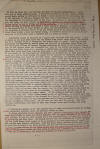
|
2.
23 December
1928 (approximate date).
Manuscript on Eastern Nicaragua, by
Major H. H. Utley,
p. 2.
" . . . It will be
noted that the western boundary was
clearly indeterminate. Later this was to
cause complications. I found the records
in the 51st Company office poorly kept,
making it difficult to obtain a clear
picture of the situation. Due to the
shortage of officers Kendall had been
tied to BLUEFIELDS and had very little
knowledge of the greater part of the
area. In addition to commanding the
company and being the only officer at
BLUEFIELDS, Kendall was AOM and SDA for
which latter duties he had no liking and
little aptitude. I was unable to find a
single order, letter, or message from
which I could deduce my mission. I
assumed it to be the preservation of
order within my area, and the protection
of American lives and property. A
personal letter to my old friend Floyd
on the Brigade Staff along those lines
evoked a most remarkable reply. I
therefore continued to act on my
assumption of my mission until a
specific one was given me later. ¶
BLUEFIELDS itself is situated on a
lagoon some distance from deep water. A
line of hills on the land side shuts off
any breeze from almost three sides. The
streets are in a terrible state of
disrepair, the houses none too good.
There are several mercantile
establishments, mostly owned and
operated by chinamen, three Clubs, and
the Nicaraguan offices of several
foreign companies, of which by far the
most important is the Cuyamel Fruit and
Steamship Co. Most of the others are
mahogany companies. The Tropical Radio
Corp. has a station at BLUEFIELDS, and
there is a government telephone line
which sometimes connects with RAMA up
the ESCONDIDO River. It is the seat of
government of the Department of
Bluefields, and historically is very
important. In fact, as I was to learn
later, the people in the interior of
NICARAGUA think only of BLUEFIELDS when
they speak of the east coast.
Politically and historically it is
important, but actually its importance
is very small, except for the fact that
it furnishes a jumping off place for
revolutionary bands. It seethes with
politics, and unfortunately the
foreigners have meddled in Nicaraguan
politics quite a bit. There are two
strategic points, from the point of view
of potential revolutionists or bandits,
- the bank at BLUEFIELDS and the
Custom-house at EL BLUFF which is across
the lagoon, on the ship channel, and the
point where all vessels enter and clear.
Some years ago an attempt was made to
move the city to the bluff but the
property owners and merchants were able
to block the very wise move. The river
ESCONDIDO derives its name from the fact
that pirates were in the habit of hiding
their vessels up that river when hard
pressed, or when it was necessary to
haul out for repairs or overhaul. Back
of the custom house at EL BLUFF there is
a steep hill, on the summit of which the
remains of old fortifications can still
be seen. Legends differ regarding the
origin of this fort, one story being
that it was built by the pirates to deny
entrance to the ESCONDIDO to British
frigates, and was captured by the
landing party of which Lord Nelson then
a junior officer was a member, which
landed near CAPE GRACIAS A DIOS and
marched down the coast, and the other
being that it was built by this force to
deny the river to the pirates. It seems
pretty certain that it was occupied by
the British in either event. Of the so
called Americans resident in BLUEFIELDS
only one “Boss” Baker seemed worthy of
confidence. An elderly man, head of the
Nicaraguan Division of the Cuyamel Co.,
head of the American Naval Intelligence
in this section during the war, his
opinions could always be accepted with
respect, and his statements relied upon.
Of the rest the less said the better.
Some were frankly anti-marine, some only
so when they thought no one was
listening who would inform us. ¶ I
deduced my mission to be “the
preservation of order and the protection
of foreign and especially American lives
and property within my area. ¶ My force
consisted of one company, the 51st
(Kendall) distributed about equally
between BLUEFIELDS, EL GALLO and PUERTO
CABEZAS, with one squad outposts at EL
BLUFF and WAWA CENTRAL. It was not well
trained and I was surprised later to
learn that little or no patrolling had
been done. The mining sectors west and
southwest of PUERTO CABEZAS, and the
WANKS River which seemed to be an
excellent and much used route of supply
for the bandits were unknown territory.
With the small force available little
more could be done than to protect the
three points, and the distribution
appeared satisfactory. A purely passive
defense of the three places with the
preservation of order in the immediate
neighborhood seemed all that could be
done, but I insisted that small patrols
be sent out to investigate the immediate
environs of each of our posts. . . . "
|
|
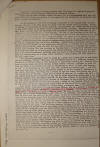
|
3.
23 December
1928 (approximate date).
Manuscript on Eastern Nicaragua, by
Major H. H. Utley,
p. 3.
" . . . There were
a few Heavy Browning Machine Guns
sufficient for defensive purposes only,
one 37mm, and the regular allowance of
Automatic Rifles. ¶ There were no known
bandits within the area, but the
northwestern part was a No Man’s Land
and a large proportion of the population
was believed to be favorably disposed
towards the bandits. ¶ On the evening of
the 28th of January I embarked on the
Cuyamel Fruit Steam Managua, for MAN O
WAY KEY, where the fruit from the GRANDE
River is loaded. Monday 30 January I
transferred to power barge #1, and
proceeded via GRANDE BAR and LA CRUZ up
the GRANDE River to EL GALLO where I
arrived Tuesday morning. Inspected the
detachment there and went over the
situation with Lieutenant Carroll and
with such of the officials of the
Cuyamel Co as were present. The key to
the position is the hill on which the
radio station is located. The Commissary
and office are located on the river bank
which at this point is quite steep and
high. The boats of the company tie up to
the bank beneath the office and are
defiladed from the hill by the high bank
of the river, but are commanded from the
office building. Considerable
subsistence stores, clothing, and cash
are carried in the commissary and
office. I directed that the defense
should include holding both the hill and
the office-commissary building with
approximately equal forces; that the
garrison on the hill keep a raving,
which afforded cover from which to
launch an attack against the office
building, under fire and the garrison of
the office-commissary building deny the
boats to any attacking party and also
keep the reverse slops of a ridge which
furnished a good jumping off line
against to the hill under fire. ¶ The
following morning I left EL GALLO in a
power boat accompanied by one Marine and
one civilian, “Johnie” Williams, the
BLUEFIELDS manager of a mahogany
company. We proceeded to TUMARIN where
we were supposed to find mules awaiting
us. However there were no mules ready
and after waiting awhile without
results, I elected to make the next lap
which I was assured was only 18
kilometers on foot. We left what baggage
we had to be forwarded by the mules when
they arrived and started out. I was soft
from much desk duty and that 18
kilometers proved to be the longest 18
kilometers in the world, bar none. The
trail was a series of ups and downs,
with sticky mud above the ankles most of
the way. About five o’clock we were met
by a native boy with a single saddle
mule which was offered to me, but my
pride forbade my riding when I was more
lightly equipped than the marine with
me. It was then offered to the marine
but he would not ride when I walked, so
it was offered to Williams. He had no
pride and mounted, and has since repaid
me for that ride in many a drink at the
Tropical Club in BLUEFIELDS as the price
for not telling the crowd there of his
inability to make the whole hike. ¶ Just
before dark we reached our destination,
a mahogany camp at the headwaters of
CARAWALLA Creek, operated by an Austrian
named Miller, who as a soldier of forune
had served with the Liberals during the
revolution as a general. He had been a
Sergeant-Major during the World War in
the Austrian Army. The camp was new, in
fact not yet completed, and was most
interesting to me. None of the buildings
were walled but the roofs were in place
and the camp was in full swing. We had
an excellent dinner and turned in early
in our hammocks swung from the mahogany
posts which supported the roof of what
was later to be the office and
commissary. The next morning while I
took a look around the marine with me
went out and shot two wild turkeys with
is rifle. Knocked the head off of each
one and then wisely refused to fire
another shot. But his prowess created
quite a stir in the camp. The following
morning Williams returned to LA CRUZ by
mule, while Miller, the marine with me
and myself started downstream in a
native pitpan hollowed out of a mahogany
tree for PEARL LAGOON where the Vrooman
Co tug was to meet us. We had a crew of
three indians and it was most
interesting to watch the adept way in
which they handled the boat through the
rapids. Twice we disembarked and walked
around rapids while the crew let the
boat down by means of a long paineer, ie
a rope made fast to one end of the boat.
But we had misjudged the time and space
factor and it was well after dark and we
were well upstream from the lagoon when
we were challenged sharply for the bank
and at Kelly’s reply learned that we
were at the head of navigation of the
KURINGWAS River and that the Vrooman tug
with an escort of marines was moored to
the bank. We three thankfully scrambled
aboard and after dismissing our boat
crew were soon under way down stream
while one of the marines prepared supper
for us on a gasoline stove of the type
used by auto camping parties in the
states, three of which are possessed by
the 51st Co. . . . "
|
|
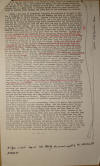
|
4.
23 December
1928 (approximate date).
Manuscript on Eastern Nicaragua, by
Major H. H. Utley, p. 4.
" [ . . . ] . . .
to sea for BLUEFIELDS. LAS PERLAS or
PEARL CITY is an excellent example of a
“dead” city. Its streets are broad, and
still plainly marked by the remains of
the drainage ditches on each side. Here
and there, averaging perhaps one to a
city block a solitary native shack or a
more pretentious store or cantina still
stands, and about half of the buildings
are occupied. ¶ After a few days in
BLUEFIELDS arranging for supplies to be
sent to GALLO, I accepted the invitation
of the USS Denver, the ship on station,
to make a trip with him to PUERTO
CABEZAS. Captain W.H. Allen had been a
shipmate of mine years ago on the old
NORTH CAROLINA, and I was well aware of
his peculiarities. He treated me however
with every consideration, and thoroughly
indoctrinated his subordinates with the
idea that the ship on station was there
to help the marines ashore. Upon our
arrival off PUERTO CABEZAS, Captain
Merritt A. Edson, the Marine Officer of
the Denver, was loaned me, to assist me
in making my inspection, and for the
further reason that Captain Allen wanted
him familiar with conditions at every
port where the ship touched. We were
hospitably received by the officials of
the Bragmans Lumber Co., and put up in a
vacant house across the street from the
buildings occupied by the Marine
Detachment. We spent one day in
inspecting and going over the situation,
and the second in going out to the end
of “the line” i.e. the railroad over
which the bananas are brought to port
from the farms. Unlike the CUYAMEL Co
which owns very few farms and operates
almost exclusively by purchasing from
sub-contractors, the Standard Fruit and
SS Co operates its own farms, doing its
clearing, planting, cultivating, and
cutting either by contract or by hiring
its own labor. This method involves a
greater overhead in supervision etc.,
but on the other hand it places the
responsibility and control in the hands
of the officials of the company. Both
plans have their advocates, both appear
to have disadvantages. We found the
detachment in good shape, quartered in
several buildings close together, one
had been erected for employees of the
company, one erected for the landing
force of one of the ships, the others
small buildings erected for various
purposes and moved to the desired
location which was an excellent one, on
the bluff overlooking the sea, well
inside the white residential section.
Guard duty was severe, almost every man
doing a watch each night, and working a
part of each day. The detachment
furnished the actual police protection
for the white residential section,
guarded the dock, the sawmill, the
company office, company commissary, and
Customs House. Some time before there
had been a number of fires believed to
have been of incendiary origin, which
had resulted in the landing of the
Marine Detachment of the USS Tulsa, and
the continuous occupation of the place
by various detachments ever since. Just
beyond the limits of the white
residential section lay the town of old
Bilway or Biway or Bilwa. This was also
policed to some extent by the marines.
The Nicaraguan Commandante, a young man
who had been educated in New York,
became somewhat of a soldier of fortune,
and eventually thrown his lot with
Sacasa and aided in the attack on PUERTO
CABEZAS had under his command two other
Commandantes and about twenty-five
policemen, all, including the
commandantes paid by the company. As
they were well paid these jobs were much
sought after, and one of my missions was
to investigate charges that had been
made that the position of commandante
and the employment by him of policemen
was illegal. Illegal or not it was the
only solution, and I duly noted the
existence of official appointments of
the Commandante, Senor Don Luis Castro.
¶ The trip out the line was most
interesting although it became very
monotonous later when necessity required
frequent trips. For the first part of
the run the line lay through the pine
ridge which extends along the coast well
into HONDURAS, then through a bit of
swampy land across the WAWA River at
WAWA BOOM and a few kilometers beyond
passes into the farm lands. Bananas by
the way have several peculiarities.
First they grow upside down, and
secondly they will not ripen on the
parent tree. The railroad is 86
kilometers long terminating just beyond
WAWA Central on the banks of the WAWA.
Here the marines occupied what was
termed an outpost. In reality it was a
detached post as it was far beyond
supporting distance, and pretty
completely isolated. The principal
function of this detachment was in
reality the support of the local
Commandante and his policemen in their
efforts to maintain order, and in this
they had been quite successful, although
it appeared that the “support” had been
mainly going out with the Commandante
and then doing the work necessary . . .
" [remainder missing]
|
|
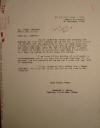
|
24 December
1928.
Letter from Capt. M. A. Edson, Poteca,
to Alfred Webster, Bocay.
"Please accept my
thanks for securing the Indians who have
been working for me for the past two
months. All of them with the
exception of one have been excellent.
I would appreciate it if you could
obtain about eight more who could come
here about the 1st of January for a
period of about two months to replace
the ones whom I now have so that they
may return to their homes for awhile."
|
|

|
25 December
1928 (0822).
Radiogram from Gen. Feland, Managua, to
Major Utley, Puerto Cabezas.
"8625 INFORM THIS
OFFICE CONCERNING SERVICES OF NATIVE
POLICE IN CAPE GRACIAS COMMA NUMBER
EMPLOYED COMMA HOW LONG THEY HAVE BEEN
THERE AND ANY OTHER PERTINENT
INFORMATION RELATIVE TO THEM 0822."
|
|

|
26 December
1928 (1615).
Radiogram from Gen. Feland, Managua, to
Major Utley, Puerto Cabezas.
"8626 MEDICAL
SUPPLIES LISTEN IN YOUR 8623 1420
DROPPED TO CUVALI ON TWENTY FOURTH STOP
PLANE UNABLE TO GET INTO CUVALI TODAY
STOP DROP OF MEDICAL SUPPLIES BROUGHT BY
MANLEY AND THOSE SUPPLIES LISTEN IN YOUR
8626 1345 WILL BE DROPPED WHEN WEATHER
PERMITS STOP 1615."
|
|

|
26 December
1928 (1703).
Radiogram from Major
H. H. Utley, Puerto
Cabezas, to CO Matagalpa.
"NINE MAN
PATROL SERGEANT BENTON IN CHARGE CLEARED
CUVALI FOR YAOSCA [YASICA] AT ZERO EIGHT
HUNDRED TODAY."
|
|
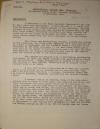
|
1.
26 December
1928 (1703).
Memorandum [on the History of the
Eastern Area], Major
H. H. Utley, Puerto
Cabezas, p. 1.
"A battalion of
the Fifth Regiment (Bartlett’s) was sent
to this coast form Guantanamo. I think
Colonel J. J. Meade came from
Headquarters and assumed command of the
Battalion. Landing parties of both
marines and blue jackets of various
ships on the east coast patrol,
including a destroyer division, covered
the coast and as far inland as EL GALLO
and RAMA. The command of these forces
rested with the Naval Commander of the
East Coast Patrol. ¶ This force was
subsequently reduced, leaving one
company of the battalion, the
fifty-first (Kendall) as a sole garrison
of this part of Nicaragua, but the
tactical command continued to be
exercised by the Naval Commander of the
East Coast Patrol until some time in the
Summer of 1927 (probably about the time
the Eleventh Regiment and Brigade
Headquarters went back to the States)
when the command passed to the Fifth
Regiment. ¶ The company had headquarters
at Bluefields, garrisoning that place.
EL GALLO and PUERTO CABEZAS with
approximately thirty men in each place.
PUERTO CABEZAS had an outpost at the end
of the railroad at WAWA CENTRAL;
BLUEFIELDS had an outpost at the Customs
House at EL BLUFF. ¶ I have very little
information as to what had happened
prior to my arrival as the records had
not been properly kept, but I believe
that Captain D. J. Kendall, U.S. Marine
Corps, now on duty at QUANTICO,
Virginia, can give you the desired
information. ¶ I assumed command 22
January, 1928, of the area which extends
from Honduras to Costa Rica,
approximately 250 miles, and “such
territory which can be controlled by
troops supplied from the East Coast of
Nicaragua”. In this area there are no
roads, few trails, one railroad, about
86 kilometers long, extending from
Puerto Cabezas to Wawa Central, but
there are nine routes east and west: the
WANKS or COCO River, the CUCALAYA River,
the BAMBANA River, the PRINZAPOLKA
River, the TUMA River, the RIO GRANDE
River, the KURINGWAS River, the
ESCONDIDO River, and the SAN JUAN River.
North and south practically all travel
is by small power schooners or even
smaller craft. The only trail of
importance is that leading frmo
MATAGALPA via TUMA and JINOTEGA via
COYALAR through LA LUZ to the PIS PIS
mining area and thence . . . "
|
|
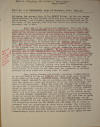
|
2.
26 December
1928 (1703).
Memorandum [on the History of the
Eastern Area], Major
H. H. Utley, Puerto
Cabezas, p. 2.
". . . following
the general line of the WASPUC River. In
the dry season transportation by boat
becomes difficult due to low water; in
the rainy season, I am informed, passage
upstream is difficult due to the force
of the current, and that the trails are
practically impassable, due to mud. ¶
About 90% of the natives are LIBERALS.
They have been taught that the
CONSERVATIVES, while in power, have
neglected this coast in the matter of
public improvements, especially roads,
and they refer to the provisions of the
original treaty of annexation, whereby
the net income from the custom houses
located on this coast was to be applied
to public schools and works here, which
they claim has never been done. They are
further convinced that the LIBERAL PARTY
was on the road to success when the
STIMSON AGREEMENT was made, and that
only American intervention prevented
their success by force of arms. The
majority of the LIBERALS in this area
belong to the extreme wing of the party,
and are therefore pro-SANDINO and
pro-SACASSA, as opposed to MONDADA. If
the election is held as planned, and if
the LIBERALS win, the situation on this
coast will be quiet for a time, assuming
that the GUARDIA functions efficiently,
but there will undoubtedly be
considerable local friction due to the
radical change in police procedure and
ethics - should there be no election or
should the CONSERVATIVES win, anything
unpleasant may happen. Reports received
indicate a probability of trouble in
HONDURAS this summer and if this proves
to be true, there is another source of
potential trouble, either as a base for
NICARAGUAN bandits or from raiding
parties and refugees from Honduras. In
any case there should be a force of not
less than two companies of marines
retained on this coast for a long time
to come. Upon taking command and making
a personal reconnaissance of the RIO
GRANDE as far as TUMARIN (at right angle
bend southwest of EL GALLO on Ham map),
CAROWALA CREEK, KURINGWAS RIVER, PEARL
LAGOON, PUERTO CABEZAS to end of
railroad, and CAPE GRACIAS, I felt that
the available force was disposed of to
the best advantage, but that it was
inadequate. There was only one company
(the 51st) in the area and it garrisoned
the three most important: PUERTO
CABEZAS, which is important because it
is by far the largest foreign investment
on this coast - about ten million
dollars - and because it furnished the
best base of operations and supply for
the sector north of the RIO GRANDE;
BLUEFIELDS, because historically and
politically, it is the center of
intrigue, and it furnished the best base
of operations and supply for the sector
south of the PRINZAPOLKA; and EL GALLO,
because it is the second most important
foreign establishment, its occupation
closes the RIO GRANDE and RIO TUMA, and
it forms an advanced base for operations
up those river basins. The occupation of
these points was all that could be done
with the force available but the
information received indicated that in
order to provide for eventualities there
should be a post somewhere on the WANKS
and one . . . "
|
|
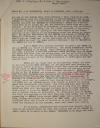
|
3.
26 December
1928 (1703).
Memorandum [on the History of the
Eastern Area], Major
H. H. Utley, Puerto
Cabezas, p. 3.
" . . . and one in
the mining area, with probably a small
outpost at RAMA. I determined, with the
co-operation of Captain ALLEN of the
U.S.S. DENVER, to conduct a
reconnoitering patrol up the WANKS and
WASPUC Rivers, and down the BAMBANA or
PRINZAPOLKA. EDSON and a few marines
were to be loaned me, and the remainder
taken from the 51st Company. It was my
desire to determine, personally, the
reliability of the information received,
and the proper location of any posts, I
desired to establish. This plan was
interrupted by the first movement of the
bandits to the northeast about the
middle of February. The Marine
Detachment of the DENVER was landed at
PUERTO CABEZAS on 21 February, and I
shifted my headquarters (consisting of
myself and one trumpeter) to the same
place on 24 February. Meanwhile EDSON
had sent two small patrols overland -
one to SACKLIN on the WANKS and one to
TUNKI. ¶ I send EDSON with fifteen
enlisted to patrol the WANKS as far as
WASPUC and thence at discretion. The
TULSA DETACHMENT landed at PUERTO
CABEZAS on 10 March. Upon learning of
the intention to land them I planned a
combined movement under MATTESON from EL
GALLO and TEBBS from here into the
mining area, but the activities of the
gun runners in the southern sector
required all available marines in that
sector and part of the TULSA detachment
to investigate and apprehend them. ¶
TEBBS and one squad made an unsuccessful
search for arms in the area round CAPE
GRACIAS, but accomplished some results
in the moral effect pronounced. KENDALL
seized some arms and ammunition on the
beach at FALSE BLUFF ready for shipment
and was very active in investigating
reports of other intended shipments.
EDSON penetrated as far as AWAWAS and
returned. He collected much information,
made valuable contacts with residents
and produced a favorable impression on
the Indians who form the bulk of the
inhabitants. He returned 25 March to
refit. TEBBS with eighteen enlisted left
on 5 April, which was the earliest that
transportation could be arranged, for
TUNKY via the BAMBANA River, with orders
to patrol the mining areas and
investigate conditions. The following
day, upon receipt of reports of a band
of twenty having made a raid down the
WANKS, EDSON and COOK with thirty-eight
enlisted left, via CAPE GRACIAS, with
orders to close the WASPUC and WANKS
River at their junction and to operate
thence at discretion. He established
camp at WASPUC the 14th, and reported on
the 18th (received here 26th), that he
was proceeding to AWAWAS (also called
AWAAS BILA) with a patrol on the 18th,
having established an outpost at SANG
SANG. All information indicated there
was a force of bandits at or near BOCAY
area and this force was estimated at one
hundred, about half armed with rifles. ¶
On 12 April, information was received
from Brigade that a band of one hundred
armed men were seen moving east on RIO
GRANDE in small boats in vicinity of RIO
NEGRO. MATTESON at EL GALLO was noti- .
. . "
|
|
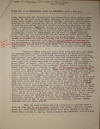
|
4.
26 December
1928 (1703).
Memorandum [on the History of the
Eastern Area], Major
H. H. Utley, Puerto
Cabezas, p. 4.
" . . . -fied, but
either the information was incorrect or
they changed their course. On the same
date Brigade informed me that two
hundred bandits, under JIRON, had made
camp at YAUSCA. On April 19th received
information that bandits had raided LA
LUZ Mine and were about 150 in number,
all armed, with machine guns, well
mounted, but with little ammunition.
TEBBS on receipt of information from me
on the 14th, of approach of bandits,
withdrew small patrol to TUNKI. Later he
withdrew his entire patrol (18 enlisted)
down the BAMBANA and PRINZAPOLKA Rivers
to PRINZAPOLKA and by boat to PUERTO
CABEZAS. There were only two courses
open to him with his small force - to
occupy a strong position and hold it, or
to withdraw. His estimate of the
situation now appears faulty, due to
incorrect evaluation of the information
received, but, due to unwillingness of
natives to act as guides or furnish any
reliable information he was severely
handicapped, and he was of course aware
that he was beyond supporting distance
of any force on this coast. His report
is quoted herewith: ¶ “Arrived TUNKI
2100 the 11th. 13th with five men left
TUNKI for BONANZA MINE, camped on TUNKI
River within two hours march of mines.
Trails vile. Daybreak 14th overtaken by
runner with message from Eastern Area
giving information that 200 bandits were
headed for PIS PIS. No one present knew
trails mentioned in message. Dropped
down river and joined remainder of
patrol at TUNKI. Sent message to Major
UTLEY by runner, 15th, took 12 men and
headed for JINOTEGA - PIS PIS trail to
intercept the bandits. At 1430 runner
from NCO at TUNKI overtook me with
message from Mr. HEAD, manager of
BONANZA MINE, stating that SANDINO was
expected there that night. They had
taken a trail from LIMON unknown to me.
Turned back to TUNKI arriving there 1900
and took position. By this time those
who had cared to leave mines had arrived
in TUNKI. 16 men were in no condition to
take trail, remained in TUNKI, sent
runner to Major UTLEY and scout to mine.
Scout returned from mine at 1100 the
17th, with information that SANDINO with
about 500 men, some mounted, some on
foot were at BONANZA MINE the evening of
the 16th, that 200 left 0600 the 17th
for BRAGMAN’S and others were preparing
to follow. Information later confirmed
through different sources. No guides or
pack animals there. 17th left TUNKI via
BAMBANA River for PRINZAPOLKA, arriving
0930 the 19th. Shown letter from A.H.
Brown to L. Elizondo Company stating 200
bandits had arrived on 14th at LA LUZ
MINE. The mine stripped. They left on
evening of 13th for NEPTUNE MINE on way
to PUERTO CABEZAS, taking assistant
manager. Evening of 15th, they received
information that 280 armed men on way to
mine, killing and burning. Arriver
PUERTO CABEZAS 1600 the 19th. TEBBS”. ¶
From the best information now available
it appears that a band of from 100 to
150 mounted bandits, all armed, with two
machine guns, but with little ammunition
moved east from YAUSCA to LA LUZ where
they arrived 12 April. They demanded MR.
AMPHLETT, the American . . . "
|
|
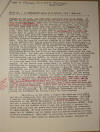
|
5.
26 December
1928 (1703).
Memorandum [on the History of the
Eastern Area], Major
H. H. Utley, Puerto
Cabezas, p. 5.
" . . . manager of
the mine, and were very insistent that
he be found. It was not until convinced
that he really was not in the vicinity
that they seized MARSHALL. They took no
other prisoners but apparently obtained
a few recruits. On the evening of the
13th, they started for LONE STAR MINE
where they were reported as “digging
in”. From there parties made raids on
the NEPTUNE MINE the 16th, 17th, and
18th. They were joined at LONE STAR by
another band of about 100. Either then
or later it appears that two other bands
joined them, one of which came from the
direction of BOCAY. On the 23rd, I was
advised that 7 officers and 200 enlisted
with one medical officer and four
hospital corpsmen were enroute from
CORINTO on the CLEVELAND. With the
bandits reported digging in at LONE STAR
and operating the NEPTUNE MINE (which
reports have since been discredited), I
planned to block the WASPUC River and
parallel trail with EDSON, reenforced by
an officer and the remainder of the
DENVER DETACHMENT, and push
reconnaissance to the south; to move two
officers and the GALVESTON DETACHMENT to
LA LUZ via the PRINZAPOLKA to block the
PRINZAPOLKA River and the trail to the
southeast over which the bandits had
come; and send two officers with a
company (less one platoon) to EDEN MINE
overland. If reconnaissance developed
that an advance was practicable up the
WASPUC, to strike with the remaining
company to drive him away from HONDURAS,
and would be the easiest force to
supply. If the routes were impractical,
to strike from the south. Difficulties
of supply made an attach in force from
here overland impracticable. MATTESON
with 35 enlisted to hold EL GALLO, close
the RIO GRANDE, and scout north and
northwest. KENDALL, with about 30
enlisted, to hold BLUEFIELDS, and close
the ESCONDIDO. TEBBS with the TULSA
DETACHMENT, a portion of the 51st
Company, and men unfit to hike, to hold
PUERTO CABEZAS, and furnish guards for
pack trains and supply flotillas. It
should be stated that there are a large
number of SANDINO sympathizers in this
vicinity, and there was an ever present
possibility that some of them might
attempt to make trouble by looting or
acts of sabotage, and I feel that any
such act will be greatly magnified.
Orders were sent to the Commanding
Officer of Marines on board the
CLEVELAND, to prepare the patrol to
operate up the PRINZAPOLKA. As the
GALVESTON Detachment did not go aboard
the CLEVELAND, he detailed half the 60th
Company. ¶ Meanwhile, on the 27th, a
report was received that EDSON had had
an engagement with the bandits and been
defeated. Although I doubted its
correctness, I directed Lieutenant
CARROLL, with the remainder of the
DENVER Detachment, to take a portable
field radio set and a month’s supplies
and move at once to reenforce EDSON.
Just one hour and two minutes after I
made the decision, I watched the lines
cast off from the power boat that was
carrying the detachment to CAPE GRACIAS.
We were fortunate in that the local
assistant manager, Mr. R. AHEARN, was in
charge that day and he rendered us every
possible assistance. This fact is
mentioned in view of various ward-room
criticisms I have heard of regarding the
delays incident to . . . "
|
|
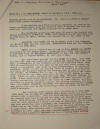
|
6.
26 December
1928 (1703).
Memorandum [on the History of the
Eastern Area], Major
H. H. Utley, Puerto
Cabezas, p. 6.
" . . . getting
patrols out in an emergency. The report
of EDSON’s engagement later proved
unfounded. ¶ I was advised that “for
technical reasons”, my request for
aerial reconnaissance from the interior
must be denied, but that request had
been made for amphibian planes to be
based here. ¶ The CLEVELAND docked at
4:00 p.m. 29 April, and marines and
stores disembarked promptly. ROSE, with
WHALING and 52 enlisted, left at 2:00
a.m., 30 April, having been delayed due
to the state of the tide. ¶ LINSCOTT,
with RANCK and 54 enlisted, left 1 May
overland via BROWN’S CAMP (on the
railroad), ENLESING’S CAMP (on the
CUCALAYA River), for EDEN MINE. ¶ EDSON
left 2 officers and 20 men to hold
AWAWAS and WASPUC and pushed up the
WASPUC River. Believing this force
insufficient, I sent TAFT with GALVESTON
DETACHMENT to hold the line AWAWAS -
WASPUC, and to support EDSON. He left
here 4 May. ¶ Two amphibians arrived via
the NITRO on 3 May. They were put over
the side and landed on our improvised
flying field the same day. A detachment
of two officers and 15 men came with
them. They will be insufficient for the
care of six (or even five) planes and
should be increased. The value of this
reenforcement is beyond expression.
There is only one landing field at
present in this area, but there are
numerous lagoons and landings can be
made on most of the rivers. At present,
due to lack of skilled operators and
consequent failure of the field sets
built on the U.S.S. DENVER to function,
I have no radio communication with TAFT,
LINSCOTT, WALKER, or ROSE. I have been
landed twice at WASPUC and have been
able to personally reconnoiter the
ground over which my lines extend.
Contact, by means of dropped messages,
panels, and pick-up messages, has been
made with EDSON, LINSCOTT, and ROSE, but
unfortunately Captain HOWARD was forced
down near LA LUZ immediately after he
picked up Captain ROSE’S messages. ¶ The
bandits, after making their junction at
or near LONE STAR MIND, and looting the
NEPTUNE MINE, moved before all of my
patrols were in position. From the best
information available about one hundred
went back to LA LUZ the 26th, and
wrecked it with dynamite. From personal
observation from the air, I am of the
opinion that the mill itself is a total
loss from an explosion, that a building
just across the road - probably the
commissary or office - was blown down by
the force of the explosion in the mill
building, and a large house, some
distance away - probably AMPHLETT’S -
totally destroyed by fire. They then
went towards WASPUC and encountered
EDSON’S advance guard at MAROBILA and
had a running fight lasting . . . "
|
|
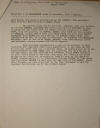
|
7.
26 December
1928 (1703).
Memorandum [on the History of the
Eastern Area], Major
H. H. Utley, Puerto
Cabezas, p. 7.
" . . . four
hours, the bandits withdrawing up the
WASPUC. The remainder went from the PIS
PIS area to CASA VIEJA. ¶ My present
lines are as follows: CARROLL, with one
section, at or near AWAWAS, guarding the
trail leading into HONDURAS in that
vicinity and the route down the WANKS
from the direction of BOCAY; TAFT, with
one platoon, at WASPUC; EDSN, with COOK
and one platoon, at TULULUK, blocks
trails west from CASA VIEJA and east
from LAKUS; LINSCOTT, with RANCK and one
platoon, at NEPTUNE MINE; ROSE, with
WHALING and 50 men, at LA LUZ, blocks
trail to JINOTEGA and MATAGALPA:
MATTESON, with 35 men at EL GALLO;
WALKER, with 59th Company (less one
platoon), moving towards PIS PIS in
support. ¶ This position accomplishes a
part of my mission, to deny territory
and supplies, especially ammunition, to
the bandits, but it does not drive them
out or destroy them. My present plan is
to advance westward on CASA VIEJA with
two platoons, one from LA LUZ up the ULI
basin, and one from PIS PIS westward,
while EDSON operates on their north
flank in the same direction, and
continue the drive as far as the force
can be supplied. TAFT to move up the
WANKS on BOCAY, towards which, it is
understood, Colonel DUNLAP is also
sending a platoon; WALKER to take over
the security of the WANKS. There will,
however, be some delay due to the time
necessary to get the supplies now
enroute, up to the forward bases."
|
|

|
27 December
1928 (0700).
Radiogram from CO Cape Gracias to Major
H. H. Utley, Puerto Cabezas.
"8627 YOUR RADIO
8626 IN PAST ONE OFFICE COMMA ONE SCT
COMMA FIVE NATIVE POLICE STOP PRESENT
GOVERNOR HERE SINCE OCTOBER THIS YEAR
COMMA SECRETARY HERE SINCE APRIL THIS
YEAR STOP AT PRESENT NO NATIONAL POLICE
HERE STOP 0700."
|
|
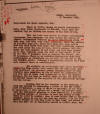
|
27 December
1928.
Memorandum for Major Hans Schmidt, B-2, from
Capt. M. A. Edson, Poteca, p. 1.
"There is little
change in bandit information here. Have
taken statements of Briseno, local jues
for Sandino, and am letting him return
to his home today. ¶ Thus far have been
unable to obtain satisfactory statements
from Hermandez and Mora beyond the
middle of August. Information obtained
by local inhabitants state that they
left there with Pedro Altimirano after
the contact at YACALWAS September 2/3,
1928; that they have been active with
his band since that date; that when
Altimarano crossed the COCO about the
date of Capt. Hall’s contact (RIO CUA)
these two were members of his band; and
that they returned the 26th of November
that we secured the pistol, etc., of
Hermandez. There is no definite
information that they participated as
principals or, in fact, in any way in
the SAN MARCOS affair, although I
personally believe that they were
present there as subordinates. ¶ The
majority of inhabitants here state that
Hermandez has been active as a bandit
for the past year; that some political
and personal grudge assassinations in
this vicinity were committed by him or
under his direction; he had with him an
order from Altimirano to kill one
Braulio Morales, who had been an active
agent for me; and that he is greatly
feared by the majority of the
inhabitants throughout the valley. ¶
Knowing that he had returned to the
vicinity, I took the liberty of
addressing a letter to him the latter
part of November, a copy of which is
enclosed. He has been in possession of
this letter for a month, and had not
acted upon the invitation extended to
turn himself in. I believe it better
policy, if possible to have him living
at home where he could be watched, than
in some hidden camp in the hills.
However, since he did not act upon the
letter, I do not feel myself obliged to
turn him loose at this time, and intend
to keep him here for an indefinite
period at POTECA. Mora, the . . ."
|
|
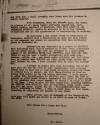
|
27 December
1928.
Memorandum for Major Hans Schmidt, B-2, from
Capt. M. A. Edson, Poteca, p. 2.
" . . . man with
him, I shall probably turn loose upon
his promise to behave himself. ¶ With
Hernandez, Mora and Briseno here, the
river is cleared of all known bandit
sub-jefes except one, Capt. Emilio
Aguila, resident of MASTAWAS, from that
point to and including GUIGUILI. Aguila
is believed to be in the vicinity of
MASTAWAS now and his apprehension or
surrendering is expected. ¶ Am enclosing
a few papers found in possession of
Hermandez. Request that a translation be
made and that copies of all messages and
papers in connection with this
particular group be furnished me. ¶
Information was furnished by a native of
GUIGUILI that following Capt. Hall’s
contact of 19 Nov. 1928, Altimirano and
his group crossed the COCO and withdrew
to a small canyon of the GUIGUILI RIVER
near VENTILLO. Also that MT. VENTILLO is
and has been a bandit stronghold, with
much corn, bananas, cattle, etc., and
fresh water available and that it is
used by Sandino when CHIPOTE and other
known camps become too hard pressed for
him. I have reported this by radio via
EASTERN AREA. ¶ I intend to patrol this
area thoroughly. Due to the fact that
all but the sick in this organization
have averaged twenty days or more out of
each month on active patrolling since we
arrive here in August, and that
three-fourths of them returned from
patrol on the day before Christmas, I
would prefer to delay this investigation
of VENTILLO until after the10th of
January or after Major Utley’s
inspection the first of next month. If
you consider this patrol urgent, of
course I am ready to start at any time.
I have in mind for this expedition,
entering VENTILLO and CHIPOTE from
GUIGUILI, then if warranted, swing
south, cross the COCO and again patrol
the CUA – GUASANEROS – GUIAPINOL area
before turning to POTECA, a trip of
about three or four weeks, depending on
conditions and bandits is any found. ¶
Havas arrived here at midnight of the
twenty-fifth, left here last night and
should be at BOCAY by noon today, the
27th. ¶ Best wishes for a Happy New
Year, ¶ Respectfully, ¶ M. A. Edson."
|
|
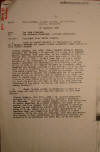
|
1.
27 December
1928.
Report on Complaint from Puerto Cabezas,
from T. T. Thrasher for Jefe Director
GN, to Division Commander, Southern
Bluefields, p. 1.
"1. There is
quoted herewith in translation a letter
from Macario Estrada and twenty others
concerning their complaint from Puerto
Cabezas: ¶ ‘Puerto Cabezas, Nov. 27th,
1928. – General Elias R. Beadle,
Managua. - Sr. General:- We enclosed you
a copy of a communication directed, this
same date, to the Minister of the U.S.
Through this communication you will take
note of what happened in this port. We
well know that you are a worthy employee
of the Government of Nicaragua and that
by your energy, rectitude and
impartiality in fulfilling your high
office of Jefe of the Guardia Nacional
de Nicaragua, have deserted the general
applause of the Nation. We do not doubt
that you will intercede in the complaint
we signed and will give ample guarantee,
freeing us from any outrage. You are the
one called to protect the Nicaraguans
for it is commended to you the meritory
task of hindering all those that want to
commit abuse of authority. Trusting that
the compliance of your duties will cover
us in an effective manner and that you
will do your best to keep this case from
the knowledge of the press, we remain,
(s) Macario Estrada and twenty others.’
¶ 2. There is also quoted in translation
a copy of a letter which was sent to the
American Minister on this same subject:
¶ ‘Puerto Cabezas, Nov. 27th, 1928. –
Mr. Charles Eberhardt, Minister of the
U.S., in Nicaragua, Managua.- Honorable
Sr. Minister: With the highest respect
which your Excellence so worthy
deserves, we allowed ourselves this
honor of directing you this present with
the only purpose of exposing before you
our complaints against the abuses of
authority which D. K. McGregor and B. L.
Booth, militaries of the American Army,
are committing with the people of Puerto
Cabezas. It is the case Sr. Minister,
that said militaries, not knowing if
duly authorized, are exercising function
of authority in an arbitrary and cruel
way; up to the limit . . ."
|
|
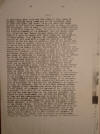
|
2.
27 December
1928.
Report on Complaint from Puerto Cabezas,
from T. T. Thrasher for Jefe Director
GN, to Division Commander, Southern
Bluefields, p. 2.
" . . . of
exhibiting with those men they take to
jail, acts of barbery, abolish since
years ago in all countries, more or less
civilized like ours. We do not mentioned
cases related to our complaint because
they are so many, horrible and
shameless, that we fear it will cause
you dissatisfaction for those that
committed them. So that you will not
believe our charges unbiased, it is
necessary that you should know that
those two men, feared already among our
people, are leaving a trail of sorrow
with their kicks and the strength of
their wrist. Just imagine, Sr. Minister,
a prisoner brought to jail tied with a
lasso and dragged by an ass, obliged to
run for fear of perishing hang to the
lasso; and already tired of running
without any more breath was obliged to
get up with a whip the bailiff used with
a show of cruelty in his back. In this
offensive act to humanity the
neighborhood can give testimony if a
just and impartial information is
followed. We can never believe that the
mentioned militaries proceed with
instructions from their superior, but
guide by instincts of cruelty, for as an
honor to justice and truth, we have
nothing to complain against the rest of
the American military men stationed in
this place. We understand that this is
an exception subject to rule and which
can be repaired by interposing your
office before whom it corresponds. Being
here a detachment of the Guardia
Nacional under the immediate direction
of the Commandante of Puerto Cabezas,
who is in charge of the control of the
town, we cannot see the idea of having
military men like those we have
mentioned, fulfilling functions of
authorities. But if there is any reason
which the abnormal circumstances of the
country required the intermission of the
Marines in the administrative affairs of
the locality, it is necessary that they
would proceed with moderation, adjusted
to the laws of Nicaragua and with
respect the principle of humanity. Be
sure, Sr. Minister, that we do not feel
adverse towards the legions of the
American army which has come in an hour
of hard proof, to guarantee the freedom
of the election in Nicaragua. As a proof
of the testimony of our acknowledgement
for the work mentioned in the previous
paragraph, we submit to your Excellence;
for, we know the alarming spirit of your
and our newspaper men and we think that
they would give to the matter colors of
great scandal which will echo beyond our
boundaries, fomenting this way the work
of discredit maintain in different
countries by systematic enemies of the
United States. In this, we trust in your
favorable resolution about these
irregularities. We are sure that you
will do all what is of justice and
convenient; and we beg you will not to
save us from the responsibility we
assume when taking this attitude, but to
save us from the temerity of the
mentioned men, making them to respect us
before exercising any vengeance. With
our best respect and consideration . .
."
|
|
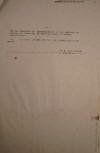
|
3.
27 December
1928.
Report on Complaint from Puerto Cabezas,
from T. T. Thrasher for Jefe Director
GN, to Division Commander, Southern
Bluefields, p. 3.
" . . . For the
Honorable Sr. representative of the
American Legation, in Nicaragua, we have
the honor to remain, respectfully.’ ¶ 3.
The above letters are for your
investigation and report. ¶ Tom E.
THRASHER, JR. ¶ By direction."
|
|

|
28 December
1928 (0945).
Radiogram from CO Cape Gracias to Major
H. H. Utley, Puerto Cabezas.
"8628 YOUR 8627
STOP PRESENT GOVERNOR DOES NOT EMPLOY
ANY NATIVE POLICE OR SOLDIERS STOP NO
RECORD WHEN NATIVE POLICE WERE DISMISSED
0945"
|
|

|
28 December
1928 (1032).
Radiogram from Gen. Feland, Managua, to
Major H. H. Utley, Puerto Cabezas.
"BONE FAVIORIZO
WHO CLAIMS TO HAVE BEEN AROUND BOCAY
RECENTLY IS AUTHOR OF ARTICLE IN LOCAL
PRESS THAT INHABITANTS OF THAT AREA ARE
DYING OF STARVATION AND SICKNESS DUE TO
SANDINISTA ACTIVITIES PERIOD INVESTIGATE
AND REPORT TRUE CONDITIONS 1032."
|
|
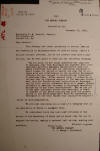
|
29 December
1928.
Letter from C. C. Mengel, President, The
Mengel Co., Louisville KY, to Sen. F. M.
Sackett, Washington D.C.
"Dear Senator: ¶
This Company has large operations in
Central America and especially in
Nicaragua where we have at times, nearly
a million dollars invested, and at the
present time have a half million, and we
were about to send you the following
telegram: ¶ ‘As you know, we are large
operators and importers of mahogany logs
from Nicaragua and together with other
important American mahogany
manufacturers have been sadly interfered
with and our operations subjected to
heavy losses for period of nearly one
year due to illegal acts and
interference by the so-called Nicaraguan
Liberals who are opposed to
Constitutional Government of Adolphus
Diaz. After careful study of situation
we believe that by vigorous support of
the American Government that the
Constitutional Authorities at Nicaragua
can and will control situation which
will permit orderly procedure of
American business in Nicaragua
heretofore enjoyed by us and other
manufacturers. May we ask you to use
your influence direct with Secretary of
State in support of the above position
and give the present policy of our State
Department which we understand is
favorable to the Diaz regime your
unqualified support.’ ¶ which is
self-explanatory. ¶ We are also
enclosing you a copy of a telegram sent
to the Secretary of State on December
24th. ¶ We understand there has been
some criticism of the action of the
Secretary of State and we would like for
you to support his action, making a
personal call on him, stating your
position. ¶ Personal regards. ¶ Yours
truly, ¶ THE MENGEL COMPANY ¶ G. C.
Mengel, President."
|
|

|
30 December
1928 (1103).
Radiogram from Major
H. H. Utley, Puerto
Cabezas, to CO Marines Poteca, Garrobo,
Cuvali.
"TO: CO MARINES
POTECA GARROBO CULVALI 30 DECEMBER 1928
¶ FROM: COMDR EASTERN AREA 8630
FOLLOWING FROM SEOBRIG QUOTED FOR
INFORMATION AND GUIDANCE QUOTE 8630
VIGILANTE PATROL OF FIFTY TWO UNDER
NATIVE WITH SEVEN MARINES OPERATING IN
VICINITY OF PENA BLANCA PERIOD PLEASE
INFORM YOUR PATROLS PERIOD PATROL MAY
SPLIT IN TWO PARTS PERIOD HAS PANEL
WHITE FIELD WITH BLACK VICE IN IT 1103"
|
|

|
30 December
1928 (1354).
Radiogram from CO Marines Poteca to
Major H. H. Utley, Puerto Cabezas.
"FROM: C O MARINES
POTECA ¶ TO: COMDR EASTERN AREA ¶ DEC
30, 1928 ¶ C5P V PSW NR NR 6 Z C 5P V
PSW GR 84 ¶ MSG LT HALL STOP LLOYD NOT
REPEAT NOT BELIEVED COMPETENT HANDLE
INDEPENDENT STATION STOP HOWEVER AM
SENDING CARROLL BOCAY THIS DATE PLACE
THAT STATION OPERATION STOP IF OPERATOR
NOT ALREADY BOCAY PLEASE SEND AS SOON AS
POSSIBLE STOP REQUEST CARROLL OR OTHER
COMPETENT OPERATOR BE ORDERED POTECA
STOP CARROLL INSTRUCTED REQUEST ORDERS
FROM COMMANDER EA UPON GAINING
COMMUNICATION WITH C5P STOP SEND BOOTS
SIZE SIX STOP QUARTERMASTER SHOES NOT
REPEAT NOT WORTH A DAMN STOP EXPECT TO
SEE YOU WITH MAJOR STOP EDSON ¶ TOR 1354
CM"
|
|
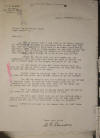
|
31 December
1928.
Letter from C. G. Eames,
Cabo Gracias a
Dios y Cruta, to United States Marine
Corps, Cape Gracias, Nic.
"Beg to advise
that I was told by Lt Alfoud Calhurn of
the Guardia National of Nicaragua when
he was here that any time complaints
were made to me where there was no
authority here or these people did not
keep within the law that I was notified
the Guardia or U.S. Marines at Cape
Gracias, which prompts me to write you
this letter. ¶ Lately an
Indian here cut up a woman and the
Commandante that he been here does not
want to arrest the man or report same to
the proper authorities at the Cape.
¶ If this keeps up then all these
Indians will go wild and no law or order
here, there must be some one here to
keep law and order, and at once. ¶
Should there be anything that I may be
able to do to keep law and order here
plese command me by the bearer. ¶
It’s not so serious that the attention
of the Marines is required here, as long
as these people know who is Commandante
or in charge here they will toe the
mark, but as things are now there is no
authority. ¶ And I am asking
you to please place this letter in the
hands of the Guardia for attention at
once. ¶ May be a good idea
that one or two Marines made a trip here
just to show these people that if they
don’t keep within the law that they will
have to pay the penalty. ¶
Please let me know by the bearer what to
tell these people."
|
|
|
|
|
PREVIOUS
NEXT
|
|
|
|
|
|
|
|
